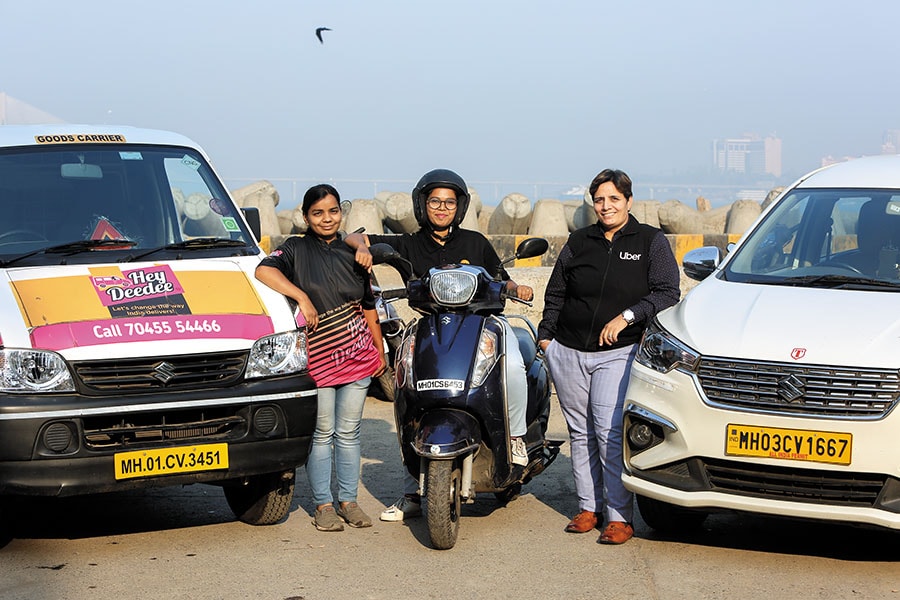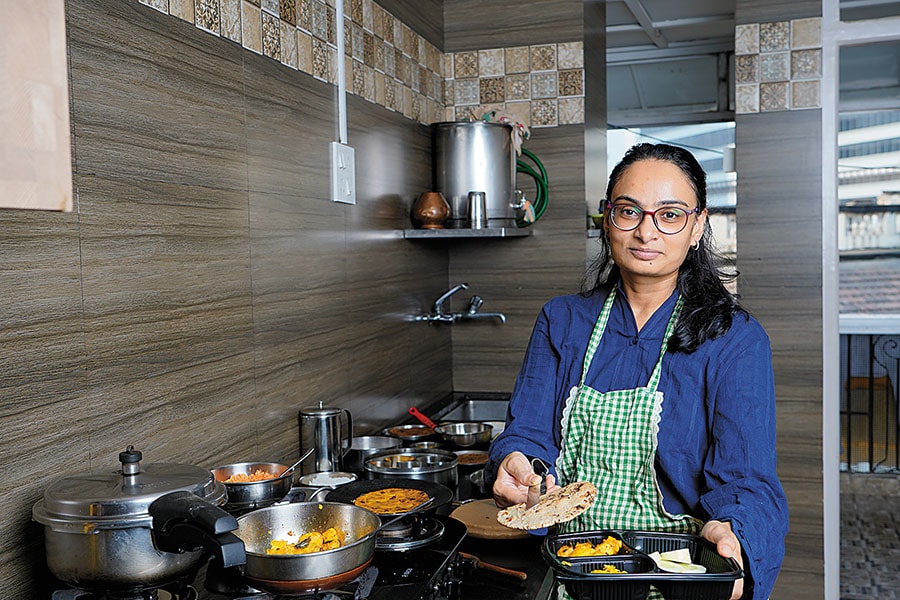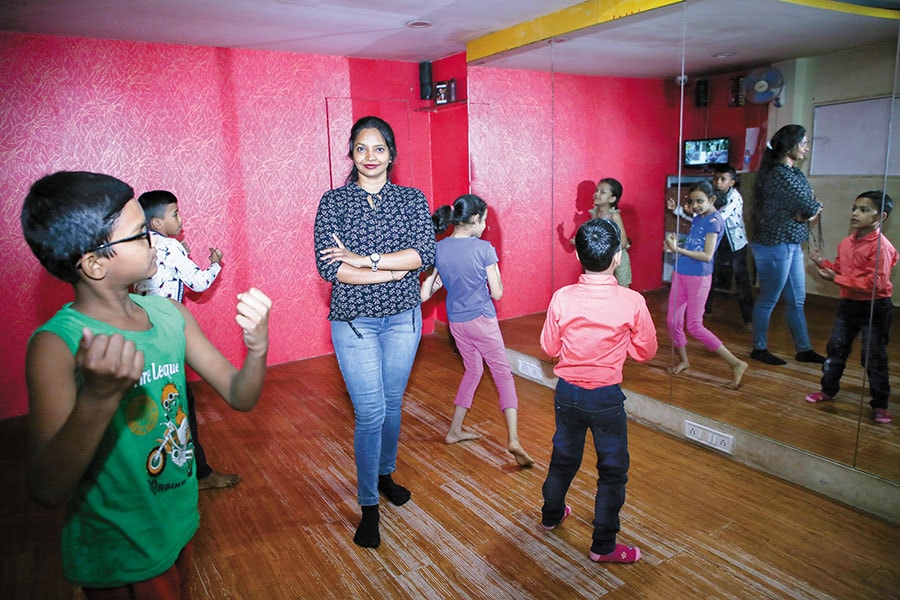
Gig economy helps India's women workers gain financial independence
The increasing participation of women as drivers, delivery and logistics professionals is enabling blue-collar women workers to pursue their dreams—but cultural barriers still exist
 (Left to right) Hey Deedee’s Nasima Shaikh, Swiggy’s Priyanka Thorat and Uber’s Harpreet Kaur have found newer opportunites in the gig economy
(Left to right) Hey Deedee’s Nasima Shaikh, Swiggy’s Priyanka Thorat and Uber’s Harpreet Kaur have found newer opportunites in the gig economyImage: Aditi Tailang
For nine years 34-year-old Seetha Laxmi, a single mother of two, had a routine: Head to Mumbai’s Borivali railway station during peak commuting hours, jostle her way into packed trains carrying a big basket full of imitation jewellery—earrings, anklets, bracelets—and try and sell it, making about ₹300 a day.
After her husband abandoned her, Laxmi had turned to hawking on trains to make ends meet. She started her day early, worked for three to four hours before taking a break to return home and check on her children—then a year-and-a-half and four—and then went back to selling her wares on the Matunga-Borivali route.
Last year in January, she heard of Hey Deedee, India’s first all-women last-mile delivery service for ecommerce, retail and other businesses. Fed up of avoiding the police and switching compartments to win over that elusive buyer, Laxmi decided to grab the opportunity at Hey Deedee.
She had always wanted to learn to drive and this was an ideal platform to do that as well as earn a living. “When I was a train hawker, nobody knew me. But once I joined Hey Deedee, I got my own identity. That feels good,” says Laxmi, a resident of Sion.
“A lot of things changed in my life after joining here as a delivery associate. I learnt many new things. I even picked up some English and try to use it in my day-to-day life,” adds Laxmi, who starts her day at 5 am, completes her household chores, gets her son (the other lives in a hostel) ready for school before heading to work. “I earn about ₹18,000 a month. I’m now saving after a long time as I plan to buy a two-wheeler. At times I also support my parents financially,” she says.
Founded by Revathi Roy in 2016, Hey Deedee operates in 15 cities, including Mumbai, Pune, Bengaluru and Nagpur, with clients such as Nature’s Basket, Amazon and Flipkart, among others. Women who join the platform undergo a 45-day training programme where they are taught to drive a car and a two-wheeler. They are also instructed on how to get a licence and trained in self-defence. Once on the road after the formal training, they deliver 30-50 parcels a day. Hey Deedee employs over 1,000 women in 15 cities.
Nasima Shaikh, 30, a housewife, is another woman who was economically empowered after she joined Hey Deedee. “My husband is an auto driver and I decided to start working too to ensure my three children get a better education,” says Shaikh adding that since she learnt to drive and became a delivery associate, she has become more confident of herself.
“A woman or man is empowered only when they are in a position to earn their own money and spend. Unless this happens, our society cannot progress,” says Roy, who was on Forbes India’s W-Power list in 2017.
For the longest time, people in blue-collar jobs remained faceless and nameless, with few options to pursue their aspirations. However, an emerging gig economy and the increasing participation of women in it provide a glimmer of hope.
According to the Employment Outlook Report by recruitment platform TeamLease, the gig economy is expected to generate more jobs in the future. It projects that the gig economy will have half of the urban workforce by 2025 and 80 percent by 2030. In 2019 alone, women gig workers accounted for about 68,000 jobs in India. Priyanka Thorat was one of them.
The 24-year-old has become a celebrity of sorts, acceding to selfie requests when she delivers food to customers. In 2018, online food ordering and delivery platform Swiggy signed up five delivery women, including Thorat, for the first time. Initially, she found reading maps and locating restaurants difficult. But now navigation has become a breeze after she learnt how to read maps with assistance from the company. “People appreciate me. I’m treated with double respect which I never got when I used to work as a domestic help,” says Thorat, whose parents passed away after she entered her teens. Since then, the resident of Worli’s BDD chawl in Mumbai has been single-handedly taking care of her three siblings.
Swiggy provides certain options for its women delivery executives. “They are free to log in at any hour and we encourage them to end their shift before 6 pm. There is also a policy where they operate in areas that are identified as safe zones. Also, as a precautionary measure, they are all provided with a pepper spray during their onboarding process,” says a Swiggy spokesperson.
Founded in 2014, Swiggy has more than 1,550 women delivery partners across 22 cities, including Mumbai, Pune, Bengaluru, Nagpur, Hyderabad, Chennai, Kochi and Kolkata.
Apart from becoming financially independent, women in the gig economy will also steer the country’s economic growth. The McKinsey Global Institute said India’s GDP could rise by $0.7 trillion if the workforce participation rate of women increases by 10 percentage points by 2025.
However, it’s easier said than done. Women in the country still battle stereotypes. Access to education and employment is a privilege for many. And convincing in-laws to allow them to work after marriage remains a major hurdle. Startups like Curryful are working to break such barriers by enabling housewives to make money by preparing meals from the comfort of their homes. Founded in 2018 by Ben Mathew, Rakesh Sasidharan and Roshni Joseph, it is a home-food marketplace that delivers homemade meals to customers. All the meals are freshly prepared and delivered in 40 minutes. “Our idea was born out of strategy as well as from our personal obsession to change the economic participation of women in society. Through research, and through opportunities we saw in our past roles, we arrived at the Curryful business model where we wanted to build a shared-economy and mobile-internet-based food service powered by women entrepreneurs,” says Sasidharan. Anuja Shah is able to make ₹6,000 a month by being a home chef on Curryful
Anuja Shah is able to make ₹6,000 a month by being a home chef on Curryful
Image: Mexy Xavier
Anuja Shah, 40, a chef at Curryful, had to discontinue her job as a lecturer at SNDT Women’s University in Mumbai due to domestic responsibilities. She was always passionate about cooking and Curryful gave her the opportunity to exercise her culinary skills. Women like her have turned their homes into cloud kitchens and their food is in demand among the millennial workforce.
Curryful has its home chefs listed on Zomato and Swiggy. “My specialty is Gujarati dishes. I keep experimenting and adding new dishes to my menu once Curryful approves them. The price ranges from ₹80-120 per dish and I manage to cater to 10-12 orders per day. I’m only preparing lunch as of now… if I start doing dinner, my income will be higher,” says Shah, who earns ₹6,000 a month. “My family is extremely supportive. In fact, there are times when my husband helps me with the packing of the food.”
Operating out of South Mumbai, Curryful has over 50 chefs and plans to expand to 25 cities and partner with 250,000 women entrepreneurs over the next three years.
According to BetterPlace, a platform for blue-collar workers, the gig economy accounts for more than 1.4 million jobs in India. Most of these include drivers, delivery associates, beauticians, maintenance workers and so on. However, TeamLease points out that there’s an 8-10 percent salary difference between male and female delivery executives; women are paid less for the same jobs.
Pravin Agarwala, co-founder and CEO of BetterPlace, disagrees. “I don’t think so. It’s completely driven by demand and performance. On the contrary, the supply is less and hence they [women] can ask for more [money],” he says. Roy of Hey Deedee concurs. “There is no pay disparity. In fact women are more diligent compared to men. They don’t waste their time after work… their focus is on going back home to their kids. Although the attrition rate is high, we are doing our best to retain employees by offering good incentives and insurance.”
It will soon be a common sight to see a woman behind the wheel while booking a cab as online ride-sharing companies have also started onboarding more women. Harpreet Kaur, 45, for instance, is a registered driver on Uber. “I joined Uber India four years ago. Since the age of 13, I was passionate about driving cars… my father was a driver and I was inspired by him. I learnt driving at a young age. But I cannot tolerate Mumbai’s traffic and so, I prefer doing night duty when the roads are empty and I can do more trips,” says Kaur, who quit studies after class 10 and now earns more than ₹60,000 a month.
 Swiggy delivery partner Laxmi Prajapati is also able to continue teaching and learning dance
Swiggy delivery partner Laxmi Prajapati is also able to continue teaching and learning danceImage: Aditi Tailang
“A lot of people said this job is not meant for girls, it’s not safe. I listen to everyone, but do what I feel is right. I’m doing something I’m passionate about and where I have the freedom to work whenever I want. There is no boss breathing down my neck and no pressure. When your family members are supportive, things become easy. Everyone in my family has been supportive as a result of which I feel powerful,” says Kaur, who lives in Chembur in Mumbai. She is the sole breadwinner of the family currently as her husband lost his job. She bought a new SUV recently on a monthly installment basis and mostly does airport pickups at night. “Customers are happy when they see a female driver. During night time, women are relieved to find a woman driver,” says Kaur.
“Through various initiatives and programmes, we aim to onboard more women and gender-diverse partners by devising a value proposition that offers earnings, safety and a support experience to them. We would like to continue onboarding more women driver partners so that they can make a mark in the industry of mobility and earn a sustainable livelihood,” says an Uber India spokesperson. He, however, refused to divulge the number of women the company has employed.
It’s not just all work and no play. Companies also give women a chance to pursue their hobbies on the side. Recently Swiggy started a campaign called ‘Swiggy Starhunt’ in which the company encouraged its delivery partners to showcase their talent on video-sharing app TikTok.
Laxmi Prajapati, 36, a Mumbai-based delivery partner with Swiggy since the past year, was enthused when she learnt about this. A dance instructor in the morning and delivery executive by afternoon, she never misses an opportunity to make a TikTok video while she is waiting at a restaurant for an order. “I love to dance… all my stress goes away. With Swiggy I’m able to pursue my passion. I teach dance in the morning and learn in the evening. There are no restrictions with Swiggy… there are days when I get orders for choreographing a wedding sangeet. I don’t have to worry about losing my job… I just go offline for the day and take up sangeet orders,” says Prajapati, who got married at 16 and has three children (a daughter and two sons). “I’m able to earn money and pursue my passion because of my family’s support. My 17-year-old daughter helps me with household work and my youngest son, who is in class 3, is also quite self-reliant. I feel blessed. I never imagined I’d get so much recognition and respect. At times when I deliver orders, people say things like, ‘We’re glad you delivered this, more power to you’,” says Prajapati, a resident of Malad. “In the future, I want to ensure my children get the best education and all the facilities that I did not get in my life. We live in a small house now and I want to buy a bigger one. Recently I bought a two-wheeler on EMI and put my children in a better school. Everything will be alright soon.”
(This story appears in the 30 November, -0001 issue of Forbes India. To visit our Archives, click here.)






